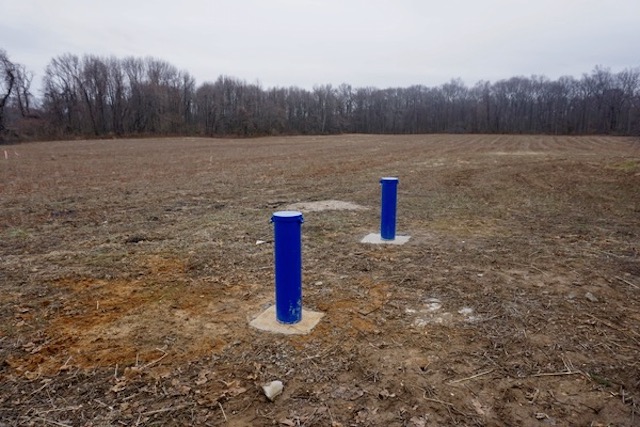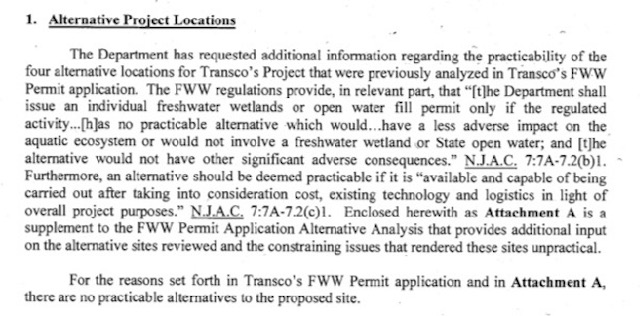Documents Show DEP Repeatedly Lied About Stream Buffer Rollbacks
“Response to public comments” opens door to abuse
The skids have been greased – the DEP permit process is rigged

recently installed groundwater monitoring wells, compressor station site, Chesterfield NJ (12/26/16)
Given how the Pinelands Commission responded to the Court’s remand and the fast track BPU amendment of the Orders in response, we can only assume that DEP will jump on the bandwagon and issue the DEP permits BEFORE THE PINELANDS COMMISSION’S PUBLIC HEARING ON THE *SJG PIPELINE ON JANUARY 24.
A lot of complex moving parts here, so pay attention!
According to *documents* obtained by the Pinelands Preservation Alliance under NJ’s Open Public Records Act (OPRA), it appears that the Christie DEP is ready to issue environmental permits for the controversial Transco compressor station (“Garden State Expansion” (GSE)) to serve the NJ Natural Gas’ (NJNG) proposed “Southern Reliability Link” (SRL) and the South Jersey Gas pipelines (SJG). Both pipelines go through the Pinelands National Reserve and were blocked by lawsuits filed by environmental groups. The compressor station is planned to be located in forested wetlands and farm fields in Chesterfield, outside but on the northern edge of the Pinelands.
These DEP permit documents also provide a smoking gun: they prove that DEP lied repeatedly to legislators, the media, EPA and the public about whether DEP’s massive 1,000+ page “overhaul” and “re-alliagnment” (DEP’s words) of the flood hazard act (stream encroachment) regulations would weaken protections and make it easier for pipelines to secure DEP permits.
DEP repeatedly claimed the the proposal would merely “streamline” the permit process and maintain current standards and protections. DEP claimed that environmental critics simply were wrong and did not understand the rule.
Those DEP lies derailed a pending Legislative Veto of the rules, and provided political cover for a dirty deal between Senate President Sweeney and Gov. Christie.
But buried on the final page of a complex 14 page December 2, 2016 letter from Williams (Transco, GSE) to DEP, we find this smoking gun admission that DEP’s rules weakened stream buffer protections:
Got that? Let me repeat: Transco noted that “change in the Flood Hazard Act Control Act Rules (sic) eliminat[ed] the 150 feet riparian zone” and that now there is a “50 foot riparian zone now present on site”.
DEP lied about how that was done too – i.e. under revised and weaker standards to obtain a “Permit by rule” (PBR). On day one, we told you so:
-
proposes 19 new permits-by-rule (PBR). There is no DEP or public review of a PBR.
Recent background
The overall project involves BPU, Pinelands Commission, and DEP approvals.
On December 9, 2016, the Pinelands Commission announced plans to fast track approval of two controversial natural gas pipelines: NJNG SRL and the SJG pipeline. The Commission schduled a public comment period and public hearing on the SJG pipeline for Jan 24, 2017 and passed a Resolution seeking to consolidate the NJNG and SJG litigation.
The Commission was forced to respond to a November 7, 2016 decision by the Appellate Division that found the prior unilateral approval by Executive Director Wittenberg violated the Pinelands Act. The Court directed the Commission to hold public hearings and determine whether the SJG pipeline was consistent with the Comprehensive Management Plan (CMP).
Wasting no time, the following Monday (12/12/16), the Christie Board of Public Utilities (BPU) quickly followed suit and responded to the Court by rubber stamping and revising prior approval Orders, as the Court directed.
Like the Pinelands Commission, BPU also ignored the Court’s mandate to revise the Pinelands CMP to address “coordinating permitting by state agencies“. After a detailed discussion of how Wittenberg violated the Pinelands Act and applied the CMP regulations to, among other things, the “coordinating permitting by state agencies”, the court directed (see the Court’s opinion @ page 20 – 24):
The Commission shall consider whether the same or similar procedures should be followed in reviewing Wittenberg’s decision. (p. 24)
Both the Commission and the BPU failed to consider and comply the Court’s mandate with respect to “coordinating permitting by state agencies” before they reconsidered prior approvals overruled by the Court.
DEP Environmental Permits
During the same timeframe that the BPU and Pinelands Commission were engaged in behind the scenes moves, the Christie DEP also has been quietly working behind the scenes to facilitate approval of pending freshwater wetlands, dewatering, and coastal zone permits for the compressor station and NJNG SRL pipeline, including a critical Clean Water Act Section 401 Water Quality Certification.
The dewatering permit for the compressor station has been held up since May. One of the key issues raised by opponents was whether construction would harm nearby wetlands and residential drinking water and agricultural irrigation wells. As the photo above shows, DEP required that Transco install groundwater monitoring wells. I suspect that this will be the cover for DEP approval of this permit: “don’t worry, we’re monitoring the situation”.
Opponents should demand that DEP require at least 4 quarters of groundwater elevation and water quality data before issuing the dewatering permit.
Similarly, for the same reason DEP required groundwater monitor wells, the project applicants should be required to collect at least 4 quarters of surface water monitoring data to document “existing water quality”, including existing biological uses.
The compressor station and NJNG SRL pipeline also must obtain freshwater wetlands and CAFRA permits. Under an EPA delegation agreement, the DEP State wetlands permit satisfies the federal Clean Water Act 401 Water Quality Certification.
After huge public turnout force cancellation of hearings back in August on wetlands and CAFRA permits, DEP held a series of public hearings on those permits, the final one was held on October 19.
Since then, DEP has been working with Transco GSE (compressor station) and NJNG SRL pipeline. It looks like DEP has sent two letter to Transco and Transco sent 2 replies. I don’t now if these are all the documents. I don’t have the DEP letters.
The most recent documents obtained by PPA involve the response to public comments on the compressor station and NJNG SRL pipeline wetlands permits.
The documents discuss a range of about a 15 technical issues – curiously they are silent on the 401 WQ Certification – but Transco and DEP seem to be focused on the alternatives analysis for the compressor station required under the wetlands rules. Here’s how Transco sees things (12/2/16 letter):
I need to review Attachment A, but there obviously are alternatives “which would have a less adverse impact on the aquatic ecosystem”, so DEP may have a strong basis to deny this permit. We won’t hold our breath for that!
Transco says they’re just responding to public comment. But obviously they are providing legal and technical defenses and are provided with another shot at persuading DEP – an opportunity the public does not have!
Here’s how Transco summarizes the conversation, at the close of a November 10, 2016 letter to DEP:
Transco merely seeks “to assist the Department with the task of responding to all comments” in “preparation of the approved permit.”
Right.
The DEP permit process is rigged
The permit process is heavily biased in favor of the permit applicant not the public.
The bias is present at the beginning and the end of the process.
At the beginning, months before the project was announced publicly, Transco, NJNG, and SJG were given multiple opportunities to meet with DEP staffers and managers.
Those meetings are known as “pre-application conferences”. They are secret and not subject to OPRA. (Listen to how the Pinelands Commission got caught on tape responding to my criticism of “pre-application conferences” with SJG pipeline.)
Those meetings provide access to DEP technical staff and upper management. They allow permittees to understand how DEP interprets the regulations and how to comply with them. They basically iron out all problems in advance and receive conceptual approval of a project before the public is even aware of the existence of a project.
After many months of technical coordination, the public then gets to comment on draft permits at the end of the process.
In this case, DEP held public hearings on the permit applications, not draft permits.
This process allowed the permit applicants to get another bite at the apple and fix any deficiencies the public identified during comments!
But Transco wants even more! They want DEP to provide any additional “new comments” to them as a courtesy so that they can “review and respond” to them –
In contrast, the public must file OPRA requests to obtain this kind of information and has no opportunity to respond to it (a repeat of getting shut out of the secret pre-application conference process).
The DEP permit process is rigged.
Given how the Pinelands Commission responded to the Court’s remand and the fast track BPU amendment of the Orders in response, we can only assume that DEP will jump on the bandwagon and issue the DEP permits BEFORE THE PINELANDS COMMISSION”S PUBLIC HEARING ON THE SJG PIPELINE ON JANUARY 24.
[* Documents provided as PDF’s upon request – sorry I don’t have them as links.]
[*Correction – I stand corrected (h/t to Theresa Lettman of PPA). I incorrectly combined the Pinelands Commission’s public hearing for the SJG and NJNG pipelines. The Jan 24 hearing is only for the SJG pipeline.
But that is merely a procedural technicality on the scheduling of the public comment and hearings.
Under the Appellate Court decision, the SJG case set the precedent for the NJNG pipeline.
Recognizing that legal reality, the Pinelands Commission passed two Resolutions on 12/9 – Res. # 4-16-43 sought to consolidate SJG and NJNG cases:
https://connect.xfinity.com/appsuite/#!!&app=io.ox/mail/compose
So, in addition to the Court’s legal precedent, it is only a matter of time before the Commission public notices the NJNG pipeline based on the SJG process.
As we noted, the Commission signaled a rubber stamp on the SJG pipeline.
So, as a matter of law and policy, NJNG approval will closlely follow the SJG approval.





Pingback: WolfeNotes.com » Christie DEP Approves Another Pipeline Through Pinelands
Pingback: WolfeNotes.com » Residents Blast Christie DEP For Issuing Final Permits To Pipeline Compressor Station
Pingback: WolfeNotes.com » Murphy DEP LNG Permit Approval & Suspension Exposes A Rigged And Corrupt DEP Permit System
Pingback: analisa usaha bengkel las teralis